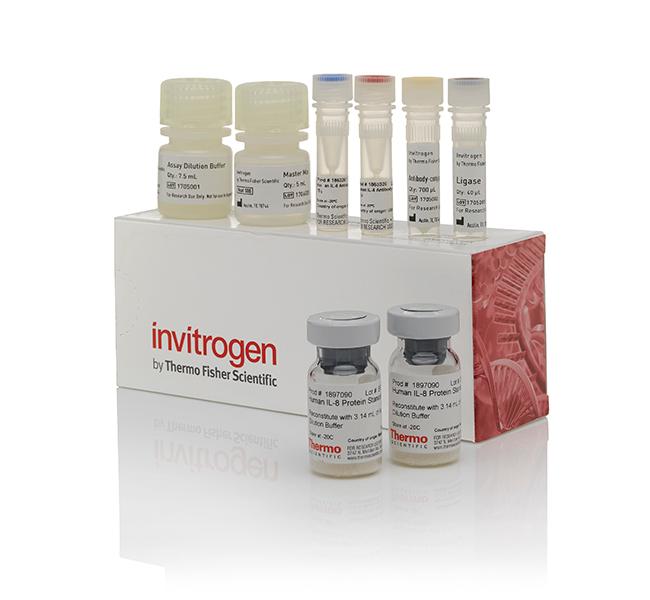Search Thermo Fisher Scientific
Product Specifications
Analytical sensitivity
Assay range
Sample type/volume
Hands-on time
Time-to-result
Homogenous (no wash)
Product size
Contents
Antibody-Conjugate A
Antibody-Conjugate B
Antibody-Conjugate Dilution Buffer
Standard
Master Mix
Ligase
Shipping conditions
Storage
Protein name
Species (tested)
Assay kit format
Label or dye
About This Kit
The ProQuantum Mouse IFN beta Immunoassay Kit is designed to provide quantitative measurements of mouse IFN beta in small sample volumes. Utilizing proximity-based amplification technology, the assay combines the analyte specificity of high-affinity antibody-antigen binding with the signal detection and amplification capabilities of real-time PCR to achieve a simple yet powerful next-generation protein quantitation platform. A user-friendly workflow combined with intuitive software for analytics enables sample-to-answer in just 2 hours.
• High sensitivity-detect low levels of protein with greater sensitivity than traditional methods
• Broad dynamic range->5 logarithmic units, minimizing sample dilutions to ensure they fall within the range
• Small sample consumption-use 2-5 µL of sample (compared to 75 µL for triplicate wells with other methods)
• Fast, easy workflow-2 hours from sample to answer, with no wash steps
• No proprietary instrument to purchase-runs on any real-time PCR instrument
ProQuantum immunoassays utilize a matched pair of target-specific antibodies, each conjugated to a DNA oligonucleotide. During antibody-analyte binding, the two DNA oligos are brought into close proximity, which allows for ligation of the two strands and subsequent creation of a template strand for amplification. This platform leverages the sensitivity and large dynamic range of Applied Biosystems TaqMan real-time PCR technology (Figure 1).
The assay workflow is fast and easy-2 steps in 2 hours. There are a total of 7 components in each kit (Figure 2). First, mix the antibody-conjugates, dilute the sample, and create the standard curve in a working plate. Then, using a multi-channel pipette, add the antibody-conjugates and sample (or standard) into the wells of a PCR plate and incubate for 1 hour. Combine the master mix and ligase and add to the wells of the PCR plate, then run the plate on any qPCR instrument. After the run is complete, import the results file into the ProQuantum software (cloud-based version at https://apps.thermofisher.com/apps/proquantum). Using this software, the data can be analyzed easily to obtain protein concentration values. The software allows you to set up standard curves, design plate layouts, apply a 5PL weighted algorithm, and obtain robust statistical group-wise comparisons.
Type I Interferons (IFN-alpha/beta) are produced primarily in response to viral infection by Natural IFN-producing cells (IPCs) as part of the host immune response. IFNs can also inhibit the development of tumors. IFN-beta binding results in the activation of the tyrosine kinases Jak1 and Tyk2, phosphorylation of members of the STAT family of transcription factors, and the transcription and expression of the immune response genes. More recently, several members of the toll-like receptor (TLR) family were found to stimulate the production IFN-beta. IFN-beta is currently used clinically for treatment of tumors, infections and multiple sclerosis.
For Research Use Only. Not for use in diagnostic procedures. Not for resale without express authorization.
References (0)
Bioinformatics
Gene aliases : Ifb, IFN-beta, IFNB, Ifnb1
Gene ID : (Mouse) 15977
Gene symbol : Ifnb1
Protein Aliases : IFN-beta, Interferon beta
UniProt ID (Mouse) P01575

Performance Guarantee
If an Invitrogen™ antibody doesn't perform as described on our website or datasheet,we'll replace the product at no cost to you, or provide you with a credit for a future purchase.*
Learn more
We're here to help
Get expert recommendations for common problems or connect directly with an on staff expert for technical assistance related to applications, equipment and general product use.
Contact tech support

